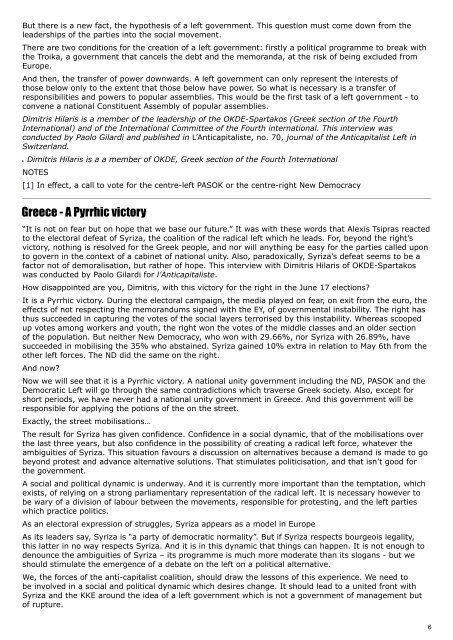Here - International Viewpoint
Here - International Viewpoint
Here - International Viewpoint
You also want an ePaper? Increase the reach of your titles
YUMPU automatically turns print PDFs into web optimized ePapers that Google loves.
But there is a new fact, the hypothesis of a left government. This question must come down from the<br />
leaderships of the parties into the social movement.<br />
There are two conditions for the creation of a left government: firstly a political programme to break with<br />
the Troika, a government that cancels the debt and the memoranda, at the risk of being excluded from<br />
Europe.<br />
And then, the transfer of power downwards. A left government can only represent the interests of<br />
those below only to the extent that those below have power. So what is necessary is a transfer of<br />
responsibilities and powers to popular assemblies. This would be the first task of a left government - to<br />
convene a national Constituent Assembly of popular assemblies.<br />
Dimitris Hilaris is a member of the leadership of the OKDE-Spartakos (Greek section of the Fourth<br />
<strong>International</strong>) and of the <strong>International</strong> Committee of the Fourth international. This interview was<br />
conducted by Paolo Gilardi and published in L’Anticapitaliste, no. 70, journal of the Anticapitalist Left in<br />
Switzerland.<br />
Dimitris Hilaris is a a member of OKDE, Greek section of the Fourth <strong>International</strong><br />
NOTES<br />
[1] In effect, a call to vote for the centre-left PASOK or the centre-right New Democracy<br />
Greece - A Pyrrhic victory<br />
“It is not on fear but on hope that we base our future.” It was with these words that Alexis Tsipras reacted<br />
to the electoral defeat of Syriza, the coalition of the radical left which he leads. For, beyond the right’s<br />
victory, nothing is resolved for the Greek people, and nor will anything be easy for the parties called upon<br />
to govern in the context of a cabinet of national unity. Also, paradoxically, Syriza’s defeat seems to be a<br />
factor not of demoralisation, but rather of hope. This interview with Dimitris Hilaris of OKDE-Spartakos<br />
was conducted by Paolo Gilardi for l’Anticapitaliste.<br />
How disappointed are you, Dimitris, with this victory for the right in the June 17 elections?<br />
It is a Pyrrhic victory. During the electoral campaign, the media played on fear, on exit from the euro, the<br />
effects of not respecting the memorandums signed with the EY, of governmental instability. The right has<br />
thus succeeded in capturing the votes of the social layers terrorised by this instability. Whereas scooped<br />
up votes among workers and youth, the right won the votes of the middle classes and an older section<br />
of the population. But neither New Democracy, who won with 29.66%, nor Syriza with 26.89%, have<br />
succeeded in mobilising the 35% who abstained. Syriza gained 10% extra in relation to May 6th from the<br />
other left forces. The ND did the same on the right.<br />
And now?<br />
Now we will see that it is a Pyrrhic victory. A national unity government including the ND, PASOK and the<br />
Democratic Left will go through the same contradictions which traverse Greek society. Also, except for<br />
short periods, we have never had a national unity government in Greece. And this government will be<br />
responsible for applying the potions of the on the street.<br />
Exactly, the street mobilisations…<br />
The result for Syriza has given confidence. Confidence in a social dynamic, that of the mobilisations over<br />
the last three years, but also confidence in the possibility of creating a radical left force, whatever the<br />
ambiguities of Syriza. This situation favours a discussion on alternatives because a demand is made to go<br />
beyond protest and advance alternative solutions. That stimulates politicisation, and that isn’t good for<br />
the government.<br />
A social and political dynamic is underway. And it is currently more important than the temptation, which<br />
exists, of relying on a strong parliamentary representation of the radical left. It is necessary however to<br />
be wary of a division of labour between the movements, responsible for protesting, and the left parties<br />
which practice politics.<br />
As an electoral expression of struggles, Syriza appears as a model in Europe<br />
As its leaders say, Syriza is “a party of democratic normality”. But if Syriza respects bourgeois legality,<br />
this latter in no way respects Syriza. And it is in this dynamic that things can happen. It is not enough to<br />
denounce the ambiguities of Syriza – its programme is much more moderate than its slogans - but we<br />
should stimulate the emergence of a debate on the left on a political alternative.<br />
We, the forces of the anti-capitalist coalition, should draw the lessons of this experience. We need to<br />
be involved in a social and political dynamic which desires change. It should lead to a united front with<br />
Syriza and the KKE around the idea of a left government which is not a government of management but<br />
of rupture.<br />
6









